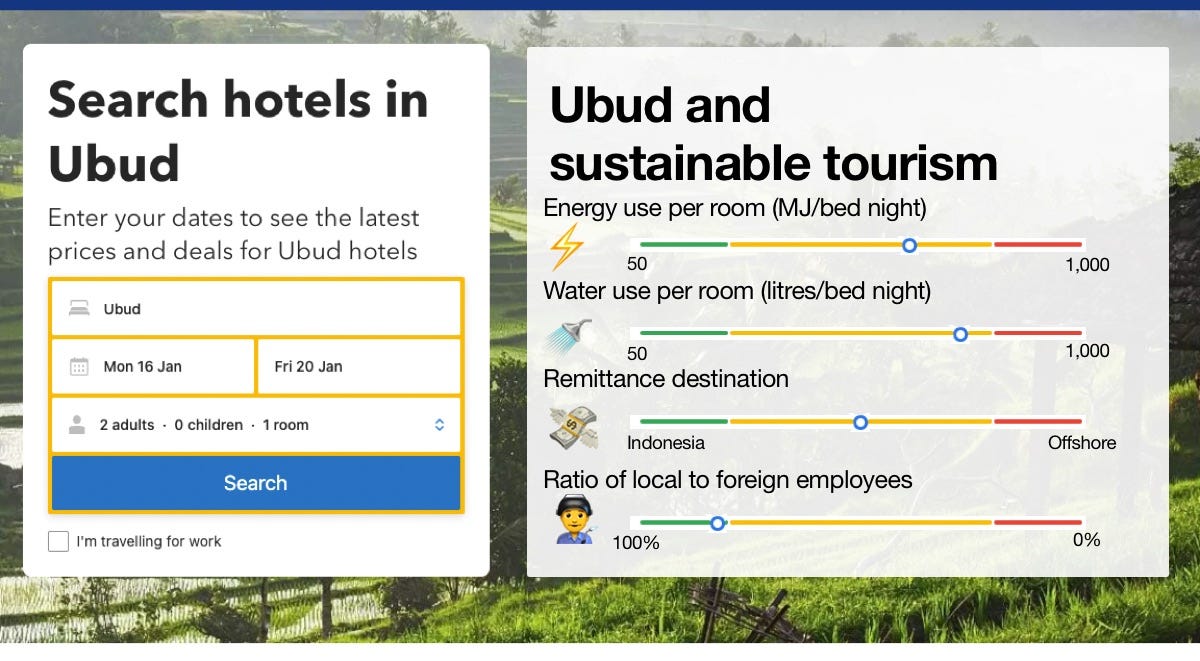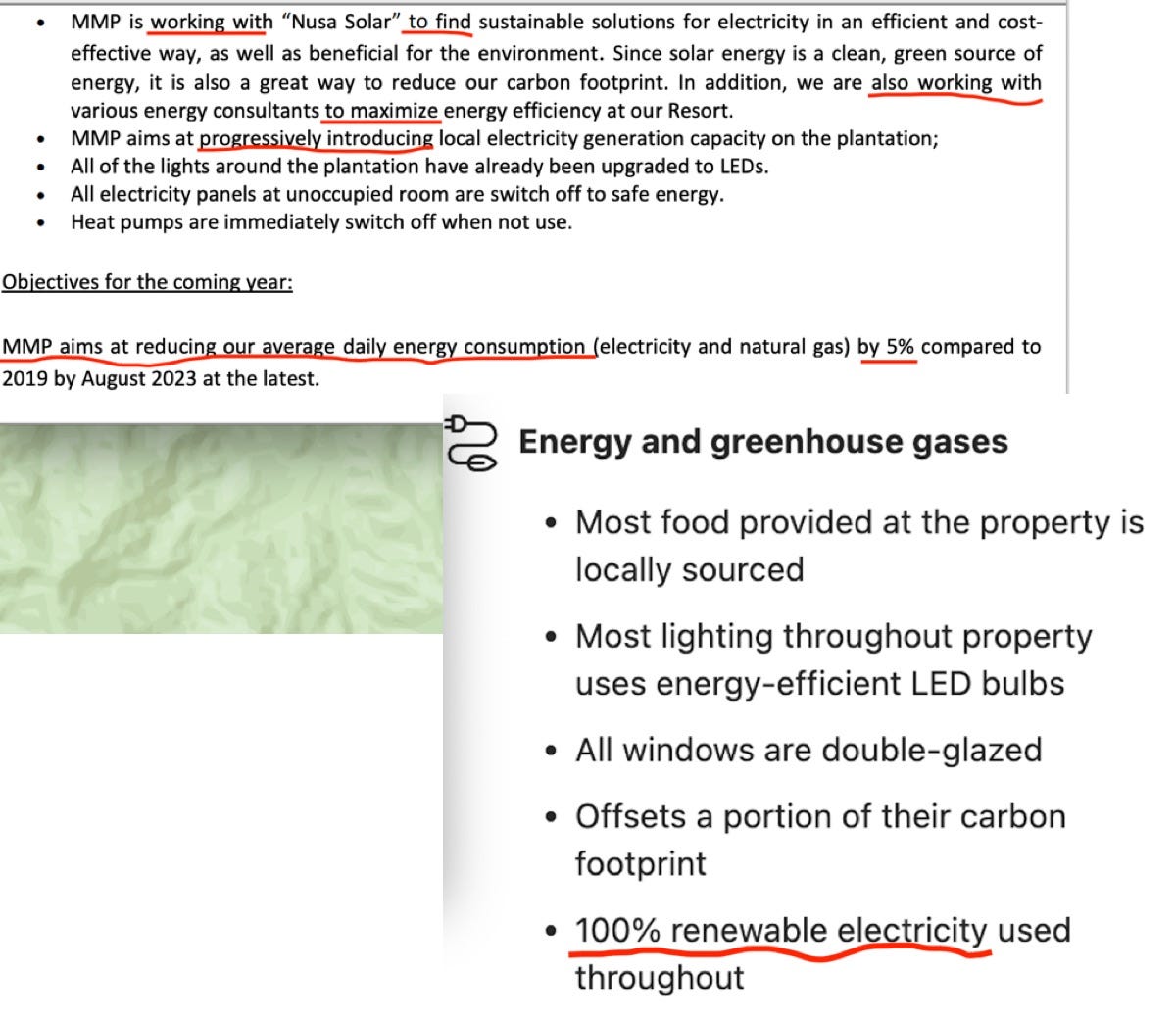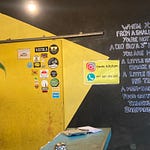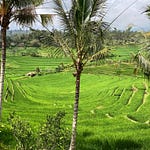A quick note up top. I had a motorbike accident yesterday and have a lot more stitches in my right arm than I’d prefer to have, so this is a shorter post than I had planned. It should be fairly self explanatory though.
You can’t throw a satay stick without hitting a report by some mob in the travel industry saying that travellers want to travel more sustainably. These surveys are often poorly run with terrible questions. I mean, who is going to say “No, I don’t want to travel sustainably”? Rather than asking people “do you want to travel sustainably,” a better question perhaps could be “would you prefer to stay at hotels without horizon pools, no air-conditioning, no foreign staff, and eating only locally-grown food?” Nobody it seems though, asks questions like this.
So, given that the OTAs like Booking, Agoda, Expedia, AirBnb etcetera are the primary gatekeepers to accommodation bookings, how could one put sustainability up front, and also, better explain what it means? Here’s four simple screens to get started.
Start with some broad strokes
In case you were wondering, the bit on the right is my addition.
So here, in the right panel we have four new summary reports for the destination. For each, the bar goes from green (good) to red (bad). The numbers indicate the lowest and highest value for the destination. The blue circle shows the average score for the same destination.
The electricity and water usage should be self explanatory. Though it is important to note that the water use per room would include all water—not just what is used in the rooms—pools, especially private pools, count too. By remittance destination, I mean where the OTA pays the money due to the hotel—the point of this being to highlight the leakages concerned with foreign-owned hotels. This is an inexact science as some OTAs don’t take the full money upfront, rather the deposit you pay is their commission, but, well, it is a start. The last one is to highlight local employment practices of properties. A better approach perhaps could be to look solely at management rather than all employees.
WTF is sustainability
Most OTAs offer filtering on stuff like price, district, facilities and so on. “Sustainability” though is a very recent add-on and can be seen to the left in the example above. There are a range of problems associated with this.
First, it isn’t clear how many sustainability actions one needs to undertake to qualify. Second, unsustainable practices don’t appear to count against a property, meaning you can have a gargantuan swimming pool powered by a personal coal-fired power station, but if you also have bamboo straws, let guests skip room service and don’t exploit animals, then it appears you can still score a sustainability qualifier. Third, while you can click through from individual property pages to see what they are doing, many things, for instance “using low-wattage light bulbs” should be a standard form of business. We are past the days where accolades are deserved for stuff like lightbulbs.
Instead, I suggest something like what I have in the right pane. The blue ticks are ones that are selected by default. So, if properties are not following the four that I have ticked (as an example) then they should not be listed by default on the OTA. Travellers should need to uncheck the box to see properties that don’t pay minimum wage for example. So, start with some base points which any property should be doing, then offer further specific aspects which people can filter on. Each should be linked to an explainer on what each one means.
Tell me the bad news up front
This is my beach shack. No, it is not for rent, I’m just using it as an example so some eco-vandal hotel doesn’t get angry at me.
On the profile page, up top the OTA could mark how the specific property compares to the averages for the destination (the blue lines are the average—excuse my poxy graphic design skills—my arm is killing me!). So in this way at a glance, at the very top of the screen, potential bookers could see how this property compares to others in the location.
OTAs could get cleverer and have perhaps moving averages for different classes of accommodation. For example high-end hotels, on average use far far far more water and electricity than a homestay does, so a sector-wide average discriminates against homestays. Likewise while I’ve used the four cases of electricity, water, offshoring and employment practices, there is no reason why other sustainability factors couldn’t be treated in the same way.
Help me understand
Hotel sustainability at top left, what it says on Booking bottom right.
The OTAs also need to do a far better job of explaining what they mean by their sustainability factors. See the example above, from what it says on Booking and what the property’s own 2022 sustainability report says. These do not mean the same thing. The 100% renewables one is clearly being abused on Booking—there are dozens upon dozens of properties in Ubud for example claiming to be using 100% renewable electricity, a claim I find extremely difficult to believe. It is far from only dubious claim, take for example the following two that often appear:
Single-use plastic water bottles not used
Single-use plastic bottles not used
Does this mean in the room or the resort? If you only select the first one, does that mean you can use plastic bottles for other stuff? Why are we making a case for water in particular? Why is this being made more confusing than it needs to be?
Help everyone understand
The core problem is OTAs are telling people a property is sustainable, when it often isn’t. Through clearer and far more prominent approach to labelling and explanations, travellers would be far better positioned to make informed choices—and that would be a good thing.
Couchfish is 100 per cent independent and reader-supported. If you’re not already a subscriber, and you’d like to show your support, become a paying subscriber today for just US$7 per month—you can find out more about Couchfish here—or simply share this story with a friend.
Don’t forget, you can find the free podcasts on Apple, Pocket Casts and Spotify as well as right here on Couchfish.














